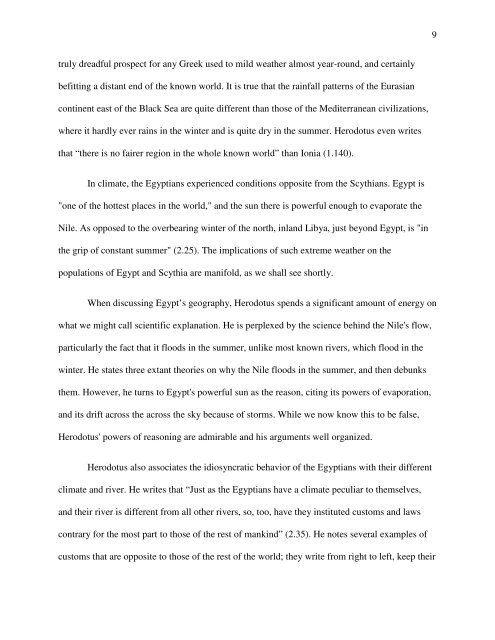The Old and the Restless - The Egyptians and the Scythians in Herodotus' Histories by Robert J. Hagan
You also want an ePaper? Increase the reach of your titles
YUMPU automatically turns print PDFs into web optimized ePapers that Google loves.
9<br />
truly dreadful prospect for any Greek used to mild wea<strong>the</strong>r almost year-round, <strong>and</strong> certa<strong>in</strong>ly<br />
befitt<strong>in</strong>g a distant end of <strong>the</strong> known world. It is true that <strong>the</strong> ra<strong>in</strong>fall patterns of <strong>the</strong> Eurasian<br />
cont<strong>in</strong>ent east of <strong>the</strong> Black Sea are quite different than those of <strong>the</strong> Mediterranean civilizations,<br />
where it hardly ever ra<strong>in</strong>s <strong>in</strong> <strong>the</strong> w<strong>in</strong>ter <strong>and</strong> is quite dry <strong>in</strong> <strong>the</strong> summer. Herodotus even writes<br />
that “<strong>the</strong>re is no fairer region <strong>in</strong> <strong>the</strong> whole known world” than Ionia (1.140).<br />
In climate, <strong>the</strong> <strong>Egyptians</strong> experienced conditions opposite from <strong>the</strong> <strong>Scythians</strong>. Egypt is<br />
"one of <strong>the</strong> hottest places <strong>in</strong> <strong>the</strong> world," <strong>and</strong> <strong>the</strong> sun <strong>the</strong>re is powerful enough to evaporate <strong>the</strong><br />
Nile. As opposed to <strong>the</strong> overbear<strong>in</strong>g w<strong>in</strong>ter of <strong>the</strong> north, <strong>in</strong>l<strong>and</strong> Li<strong>by</strong>a, just beyond Egypt, is "<strong>in</strong><br />
<strong>the</strong> grip of constant summer" (2.25). <strong>The</strong> implications of such extreme wea<strong>the</strong>r on <strong>the</strong><br />
populations of Egypt <strong>and</strong> Scythia are manifold, as we shall see shortly.<br />
When discuss<strong>in</strong>g Egypt’s geography, Herodotus spends a significant amount of energy on<br />
what we might call scientific explanation. He is perplexed <strong>by</strong> <strong>the</strong> science beh<strong>in</strong>d <strong>the</strong> Nile's flow,<br />
particularly <strong>the</strong> fact that it floods <strong>in</strong> <strong>the</strong> summer, unlike most known rivers, which flood <strong>in</strong> <strong>the</strong><br />
w<strong>in</strong>ter. He states three extant <strong>the</strong>ories on why <strong>the</strong> Nile floods <strong>in</strong> <strong>the</strong> summer, <strong>and</strong> <strong>the</strong>n debunks<br />
<strong>the</strong>m. However, he turns to Egypt's powerful sun as <strong>the</strong> reason, cit<strong>in</strong>g its powers of evaporation,<br />
<strong>and</strong> its drift across <strong>the</strong> across <strong>the</strong> sky because of storms. While we now know this to be false,<br />
<strong>Herodotus'</strong> powers of reason<strong>in</strong>g are admirable <strong>and</strong> his arguments well organized.<br />
Herodotus also associates <strong>the</strong> idiosyncratic behavior of <strong>the</strong> <strong>Egyptians</strong> with <strong>the</strong>ir different<br />
climate <strong>and</strong> river. He writes that “Just as <strong>the</strong> <strong>Egyptians</strong> have a climate peculiar to <strong>the</strong>mselves,<br />
<strong>and</strong> <strong>the</strong>ir river is different from all o<strong>the</strong>r rivers, so, too, have <strong>the</strong>y <strong>in</strong>stituted customs <strong>and</strong> laws<br />
contrary for <strong>the</strong> most part to those of <strong>the</strong> rest of mank<strong>in</strong>d” (2.35). He notes several examples of<br />
customs that are opposite to those of <strong>the</strong> rest of <strong>the</strong> world; <strong>the</strong>y write from right to left, keep <strong>the</strong>ir
















